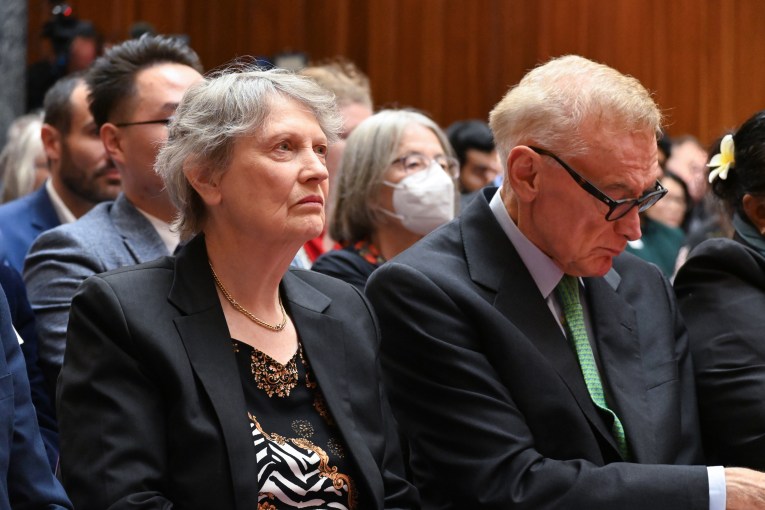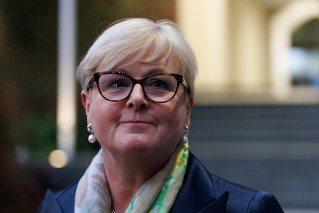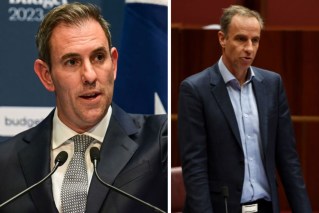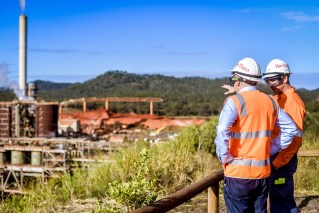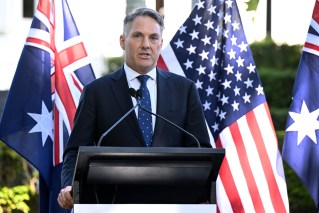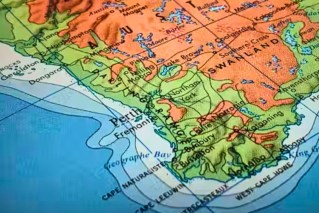Penny Wong promised a new approach to rising China. Did she deliver?

On the day before the election then Prime Minister Scott Morrison received an urgent warning from a key ally about a fracturing Pacific.
Like many Pacific islands, Micronesia is now influential far beyond its size as Beijing asserts influence in a region vital to the global defence of America (and by extension Australia).
President David Panuelo was ringing the alarm about a Chinese proposal for co-operation with 10 nations on a range of issues, but especially security and law enforcement.

Micronesia’s President David Panuelo (with China’s Premier Li Keqiang) sounded an early warning to Australia on China and security. Photo: Getty
“China is seeking […] to acquire access and control of our region,” President Panuelo wrote to Mr Morrison and other regional leaders the day before the election, according to a leaked copy of the correspondence.
“I believe [this] is the single most, game-changing proposed agreement in the Pacific in any of our lifetimes.”
Foreign and security policy featured to an unusual degree in the recent election campaign.
Labor promised to revive diplomacy after what it said had been a half-hearted effort as the Solomon Islands stood on the verge of signing a hugely consequential security deal with China.
So as attention centred on the Quad and Tokyo, the Albanese government’s first real foreign policy challenge had already landed in its in tray.
Under new management?
So has the new government done anything different?
Sources tell The New Daily that Australia had not, as expected, undertaken frontal lobbying efforts of Pacific governments about Beijing’s proposal out of respect for sovereignty.
Australian envoys have been making a more modest case that the plans would undermine the Pacific Islands Forum.
Any vote on whether to adopt China’s security plans and far-reaching proposals seems set to be determined by the state of countries’ relationships with China and whether the plans will produce economic benefits.
Melanesian countries, including the Solomon Islands and Papua New Guinea, are likely supporters while Samoa and Micronesia – which can look to America for its defence – are more likely to be positioned on the other side.
But top Ministers in two Pacific nations were as late as Thursday expressing indifference or ignorance of the plan and awaiting a planned visit and sales pitch from China’s Foreign Minister Wang Yi. Foreign policy is the prerogative of the leader in some Pacific countries, which makes outcomes more difficult to predict.
After arriving in Fiji on Thursday Senator Wong has focused on engagement that might later tip the difference in Pacific nations’ deliberations on such proposals while also presenting the case against locking in Beijing as a leading policy influence.
The Foreign Minister focused on the PIF, a grouping still limping after an internal leadership dispute but which will be a vital counterweight to any future co-operation led by Beijing.
Ms Wong met the PIF Secretary-General Henry Puna and addressed the forum secretariat two days before her Chinese counterpart Wang Yi was set to arrive in Suva.

Penny Wong met Henry Puna, the Secretary-General of the Pacific Island Forum, on her first solo overseas trip as Foreign Minister. Photo: Getty
“We will listen,” the minister said in her address late on Thursday. “Climate change is not an abstract threat, but an existential one.”
In a later press conference Ms Wong drew a comparison between Australia and China on values, including press freedom. There was also a pointed reference to criticisms of Mr Wang’s stage managed approach to official visits and the downsides of aligning more closely with China.
“Our objective is your independence and your own economic sustainability and prosperity,” Senator Wong said.
It is however a bigger relationship that is currently hanging over Australia’s foreign policy.
The new government representing Australia on the world stage was an occasion for media commentators to shower Labor in praise after tarring it with low expectations.
Last time it was in power, Labor oversaw the defence posture review, the marine rotation in Darwin and space and radar installations. And yet Anthony Albanese, into his third decade in public life, was said to have passed his first test for not immediately blowing up ANZUS.
Labor had played a dead bat to news Premier Li Keqiang may be seeking a rapprochement after recently seeing off a scare campaign questioning its loyalties.
Hot, angry, shrill
Now the media shows enthusiasm for anything resembling a pushback to Xi Jinping from Mr Albanese.
This creates an incentive to fuel a national debate on China that the Economist described as “hot, angry and shrill”.
In the campaign this peaked with the former defence minister saying Australia must prepare for war or ringing the alarm about a ship passing outside the boundaries of our territorial sea.
As its rhetoric reached new heights the previous government’s strategic ambitions on China and much else shrank as an obsession with defence crowded out diplomacy.
Whether an Albanese government can present a clear and realistic view of China will determine the success of its contributions to competition in the Pacific. Vastly outspent, Australia will have to pick its battles carefully to provide an effective counterbalance.
In the Pacific, where similar moves have been rolled out for over a decade, reactions to China’s latest proposal are tempered by what foreign policy types might call realism.
As one diplomat said, after discussing whether the failure of Beijing’s past interventions was caused by malign intentions or indifference to consequences: “Whatever it is, they are not going to just go away though, are they?”
China’s increased assertion of its national interests was a perhaps inevitable consequence of the growth in its economic interests. It was almost certain to overturn at least a few geopolitical chess pieces.
Managing decline would be an uninspiring two-word title for a foreign policy whitepaper. But after recently overheated debate it bears remembering that the cliche about diplomacy being the art of the possible is actually a reflection on its limitations.
